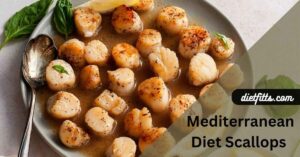Mediterranean Diet Granola – A Delicious Treat!
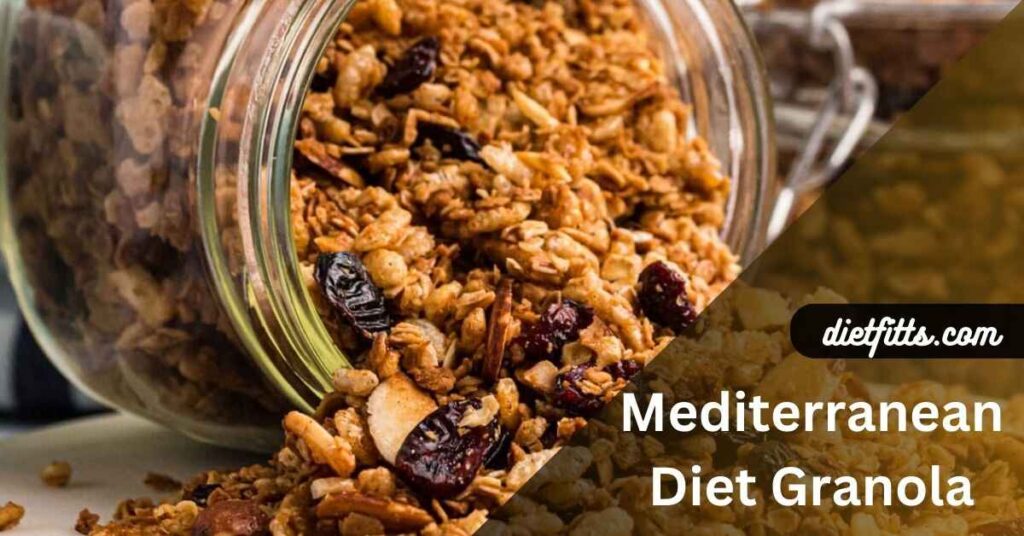
Looking to add something yummy and healthy to your Mediterranean diet? Try making your granola! This snack is full of good stuff that fits well with the Mediterranean diet.
Mediterranean diet granola is a healthy snack made from whole grains, nuts, seeds, olive oil, and dried fruits. It follows Mediterranean diet principles and offers a tasty option for breakfast or snacks. Other grains, such as puffed rice, dried fruit, seeds, spices, and nut butter, can also be included.
In this article, I will discuss the Mediterranean diet granola and share some delicious homemade recipes. Stay tuned!
Table of Contents:
Health Benefits Of Mediterranean Diet Granola – Have A Look!
1. Heart Health: Oats, a key granola component, contain a soluble fiber called beta-glucan. This fiber lowers cholesterol levels and potentially reduces the risk of heart disease.

2. Weight Management: Despite its calorie density, Mediterranean diet granola can be a valuable addition to a balanced diet when consumed in moderation. Its fiber and protein content help to:
- Increase satiety
- Prevent overheating
- Supporting weight management efforts
3. Blood Sugar Control: Whole grains in Mediterranean diet granola give steady energy and keep blood sugar stable. It’s good for people with diabetes or those who want consistent energy all day.
4. Nutrient Density: Mediterranean diet granola is full of important stuff like:
- Fiber
- Vitamins
- Minerals
- Antioxidants
These are all good for your health. Eating this nutritious granola can ensure you get all the daily vitamins and minerals.
5. Disease Prevention: Dried fruit and nuts contain antioxidants, like vitamin E, that reduce inflammation in the body. Antioxidants also stop cell damage, which can lead to diseases like cancer.

6. Improves Blood Pressure: Foods like flaxseeds, fruits, and whole grains, can lower high blood pressure. If you eat more whole grains and vegetables, you might need less medication for high blood pressure.
7. Helps with Migraine: Granola can help people with migraines feel better. It contains lots of manganese, which fights inflammation, improves blood flow, and keeps blood vessels healthy.
8. Healthier Gut Bacteria: In a 2022 study, volunteers who ate high-fiber granola daily for 3 days saw increased blood-sugar-controlling gut bacteria. The granola used had twice the fiber of typical store-bought granola.
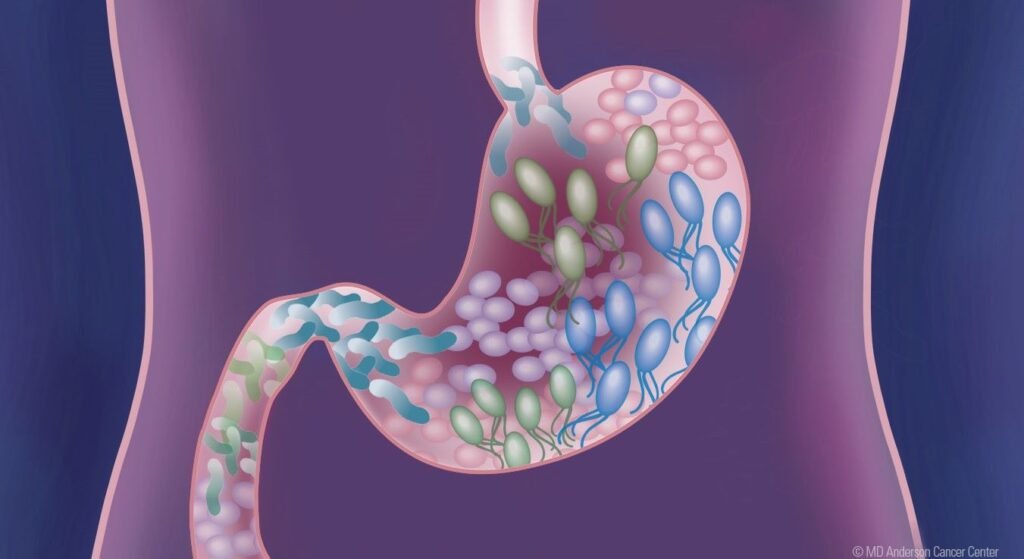
The Downsides Of Granola – Must Consider It!
1. Calorie Density: Granola can be calorie-dense due to its ingredients, such as nuts, seeds, and sweeteners. However, if consumed in large quantities, it may contribute to weight gain.
Also Read: What Foods Are Not Allowed On Mediterranean Diet – Guide In 2024!
2. Saturated Fat: Some granola recipes or brands contain a lot of unhealthy fat, usually from coconut oil. Eating too much unhealthy fat can hurt your heart. Look for granola with healthier fats, like nuts and seeds.
3. Added Sugars: Many store-bought granolas contain added sugars to enhance flavour, which can contribute to excess calorie intake. This can lead to negative effects on health, such as an increased risk of obesity and dental issues.
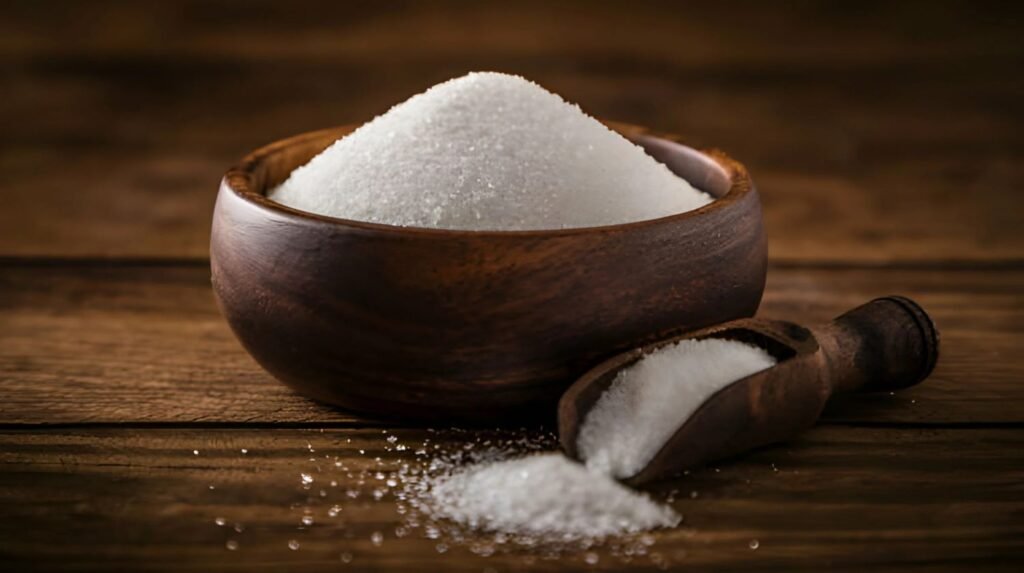
4. Processed Ingredients: Some store-bought granolas may contain processed ingredients, artificial additives, and preservatives. These might not be compatible with a whole-foods-based diet and could have health effects in the long term.
Finally, You’ve learned about the benefits and drawbacks of Mediterranean Diet Granola. It’s time to explore its nutrition facts and try a homemade granola recipe. For global discussions and more insights, visit the Reddit website.
Granola Nutrition Facts – What You Must Know!
| Nutrition Facts | Amount per 1/2 Cup Serving(brand vary) |
| Calories | 202 |
| Protein | 5 g |
| Total Fat | 5.6 g |
| Saturated Fat | 0.6 g |
| Carbohydrate | 35 g |
| Fiber | 5 g |
| Sugars | 10 g |
| Sodium | 24 mg |
| Iron | 1 g |
| Magnesium | 58 mg |
| Potassium | 232 mg |
These values are based on a typical serving size according to the USDA.
Key Components Of Mediterranean Diet Granola – Customize Your Granola!
1. Whole Grains:
Mediterranean diet granola typically incorporates whole grains such as rolled oats, which provide fiber, vitamins, and minerals. Fiber-rich foods like oats help in:

- Promote digestive health
- Regulate blood sugar levels
- Contribute to a feeling of fullness
- Aiding in weight management
2. Nuts and Seeds:
Adding nuts and seeds to granola enhances its texture and flavour and boosts its nutritional profile. Common additions include almonds, walnuts, pecans, and pumpkin seeds, which are rich in heart-healthy fats and protein. They provide essential nutrients like vitamin E and magnesium.
3. Olive Oil:
Instead of using traditional cooking oils or butter, Mediterranean diet granola features heart-healthy olive oil. This serves as the primary fat source. Olive oil is packed with monounsaturated fats and antioxidants, which help reduce inflammation and guard against chronic diseases.
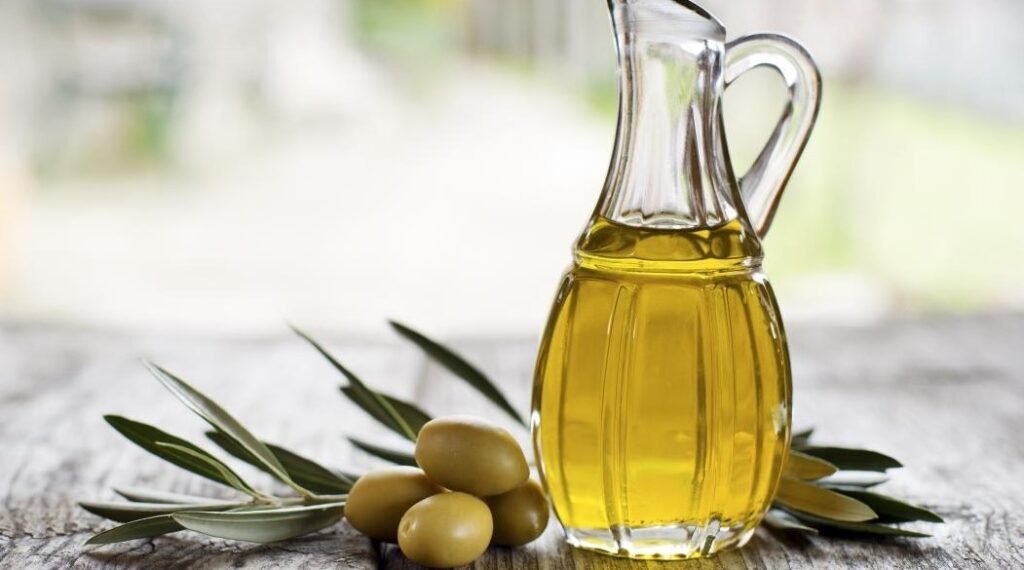
4. Dried Fruits:
Dried fruits such as raisins, apricots, and cranberries add natural sweetness to Mediterranean diet granola. This eliminates the need for added sugars.They also provide vitamins, minerals, and antioxidants, making them a nutritious addition to this wholesome breakfast option.
5. Herbs and Spices:
Cinnamon, nutmeg, and cardamom often infuse Mediterranean flavours into the granola. These aromatic ingredients enhance the taste and offer potential health benefits. They provide anti-inflammatory and antioxidant properties.
Must Read: Can You Have Bacon On The Mediterranean Diet – Explore Burning Facts!
If you’ve never made your granola, now is the perfect time to start! Homemade granola is easy to make and very satisfying. It’s much better than most store-bought granola, healthier, and you can customise it any way you like. What more could you want?
Honey and Olive Oil Granola – Must Try It!
Ingredients:
- 2½ cups old-fashioned rolled oats
- 1 cup chopped almonds
- 1 cup chopped walnuts
- ⅓ cup pepitas (hulled pumpkin seeds)
- 3 tablespoons sesame seeds
- 1 teaspoon kosher salt
- ⅓ cup olive oil
- ⅓ cup honey
- 1 cup small diced mixed dried fruit (apricots, raisins, pitted dates, cranberries)
Instructions:
- Preheat the oven to 300°F and line a baking sheet with parchment.
- Mix the oats, almonds, walnuts, pepitas, sesame seeds, and salt in a large bowl.
- Add the olive oil and stir until all ingredients are coated. Then, add the honey and mix again.
- Spread the mixture on the baking sheet and bake for 50 minutes, stirring once halfway through, until the oats are golden brown.
- Add the dried fruit, stir, and spread the granola evenly, pressing it down with a spatula or wooden spoon. Lightly sprinkle with salt and let it cool completely.
- Break the granola into pieces and keep it in an airtight container.
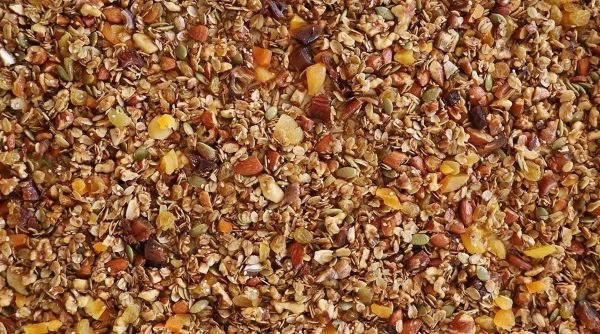
Note: Store at room temperature for up to a week. I prefer olive oil for my granola instead of vegetable or canola oil for a few reasons. First, I always have olive oil handy. Second, it adds a nice savoury taste that balances the sweetness. Lastly, olive oil is healthier, which is great since I eat a lot of granola.
Homemade Granola For Healthier Choices – Tips For You!
Control Your Ingredients: When you make granola at home, you can control the ingredients. You can reduce added sugars and use healthier fats such as olive oil. You can also manage nuts, seeds, and whole grains according to your choice.
Read Also: Weight Watchers Mediterranean Diet – Discover The Power Of Combining!
Control Your Sweeteners: Many store-bought granolas contain high amounts of added sugars. It can contribute to excess calorie intake and have negative effects on health. Homemade granola recipes often use natural sweeteners like honey or maple syrup in moderation.
Customisable: Homemade granola recipes are highly customisable, allowing you to tailor the ingredients to your preferences and dietary needs. You can add or omit ingredients based on allergies, taste preferences, or nutritional goals.
Cost-Effective: Store-bought granola can be expensive, but making it at home is cheaper. Buying ingredients in bulk also saves money. You can make big batches that last for many servings, which saves time and money in the long term.
Frequently Asked Questions:
1. Is granola healthy for weight loss?
Foods with lots of fiber, such as oats and whole grains in granola, help you feel full for a long time. Studies have also shown that eating a high-fiber diet may help you lose weight. Dried fruit and nuts have antioxidants like vitamin E that can reduce inflammation.
2. Is Greek yogurt and granola a healthy snack?
Yogurt and granola are often enjoyed as a healthy breakfast or a layered snack. Both have many nutritional benefits and eating them together or separately can be a healthy part of your daily diet.
3. Is granola high in carbs?
Store-bought granola often has a lot of sugar, with at least 9 grams per ¼ cup serving, making it high in carbs. Granola with at least 5 grams of added sugar is not the healthiest choice. Thankfully, low-carb granola options are available.
Conclusion:
Making your Mediterranean diet granola is a delicious and nutritious way to enhance your diet. It allows you to control ingredients, reduce added sugars, and use healthy fats.
You can tailor granola to your taste and dietary needs with customisable recipes. This ensures a healthy, cost-effective, and satisfying snack or breakfast option.

Hi! I’m Olivia Steeve, a certified nutritionist with over 11 years of experience in the field of diet and nutrition. At DietFitts, I focus on providing scientifically-backed, practical advice to help individuals achieve their health and fitness goals through balanced eating. I share insights, tips, and personalized guidance to help you make healthier choices and live your best life.

